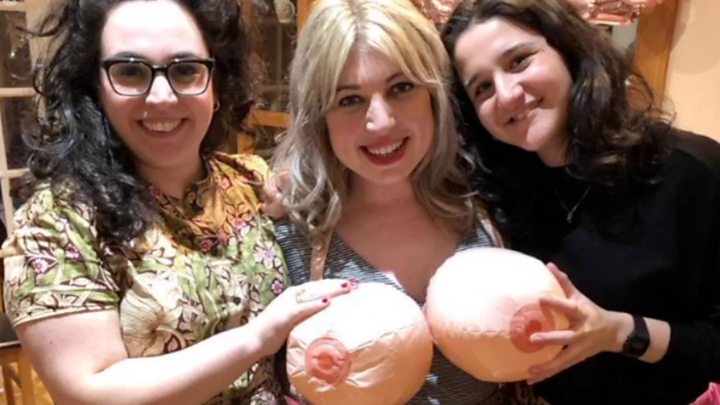Image copyright
Hayley Minn
Hayley Minn says that other people sharing their story with her helped her through the experience
When Hayley Minn was 23, she found out she had an 85% chance of getting breast cancer.
That’s because she has a gene mutation called BRCA1, which affects around one in every 300-400 people. This is her story in her own words.
Image copyright
Hayley Minn
Hayley’s grandmother died of breast cancer when she was 49
My dad’s mum died because of breast cancer when he was just eight years old.
I’d grown up knowing that, but had no idea there could be a genetic link until my dad’s cousin was also diagnosed with breast cancer in 2013.
For peace of mind I decided to get tested to see if I had a BRCA gene mutation. I remember it like it was yesterday, sitting nervously in hospital with mum and dad, waiting for the results.
When the counsellor came out to personally escort us into her office, I knew it was bad news. I decided right there and then I wanted my boobs removed (what doctors call a preventative double mastectomy).

Media playback is unsupported on your device
I’d always had big boobs and while, yes, they are a sign of my femininity and I’ve always loved them, they are just boobs and I knew that getting rid of them would save my life.
My thought process was always that I’d prefer to live to a ripe old age and not be able to breastfeed than leave my future kids with no mum.
After lots of careful thought and hospital appointments I ended up having my double mastectomy and reconstruction on 13 February 2019, aged 27.
Despite people constantly asking me if I was nervous about my operation in the run-up to it, I didn’t feel any nerves until the moment I kissed my mum and dad goodbye and went down into theatre. I was shaking and started crying, so to calm me down, the surgeon put on Ariana Grande for me. In all honesty, falling asleep to Thank U, Next was ideal.
Image copyright
Hayley Minn
Hayley says she’s “always loved” her breasts
BRCA: The Facts
- We all have BRCA1 and BRCA2 genes, which we inherit from our parents
- The genes’ job is to repair DNA and cells
- If they have a fault or alteration (also called a “mutation”), you are at a higher risk of developing breast cancer and ovarian cancer
- This is because the genes cannot repair damaged cells, which can build up and form tumours
- In the UK around 1 in every 300-400 people carries a harmful BRCA mutation
- The risk is higher for the Ashkenazi Jewish population, 1 in 40 of whom carry a faulty BRCA gene
- If you have a high-risk cancer gene, like an altered BRCA1, it can be passed on to your children
- BRCA genes are not the only cancer risk genes
Source: NHS and The Eve Appeal
Image copyright
Getty Images
In 2013, Angelina Jolie revealed she’d had a double mastectomy after being diagnosed with a BRCA 1 gene mutation
The first two days of recovery were the worst: having to get my mum to do absolutely everything for me – including pulling my trousers up and down – was embarrassing.
But I gradually managed to do things myself. I was only on painkillers for two weeks, and my boobs do look amazing! The scarring is so tiny, I just have two semi-circles above my nipples, and I sometimes forget I’ve even had the operation.
It really does feel like I’ve had a boob job that saved my life.
Image copyright
Hayley Minn
Before the op Hayley threw a “bye-bye boobs party”
Something that really helped me throughout this whole experience was joining a WhatsApp group of girls who also have either the BRCA1 or BRCA2 gene mutation.
We’re all aged between 27 and 40 and are at different points on our breast cancer journey. Some have had mastectomies, some are getting one soon, others don’t feel ready just yet.
Some have had children, some not, some are in relationships and others aren’t. But speaking to them lessened my fears.
They’ve been there whenever I’ve had any concerns and I’m now able to advise others about to go through the mastectomy process.
If you’ve been affected by any of the issues discussed in this article, you can find help at the BBC Advice pages.
Follow Newsbeat on Instagram, Facebook, Twitter and YouTube.
Listen to Newsbeat live at 12:45 and 17:45 weekdays – or listen back here.
